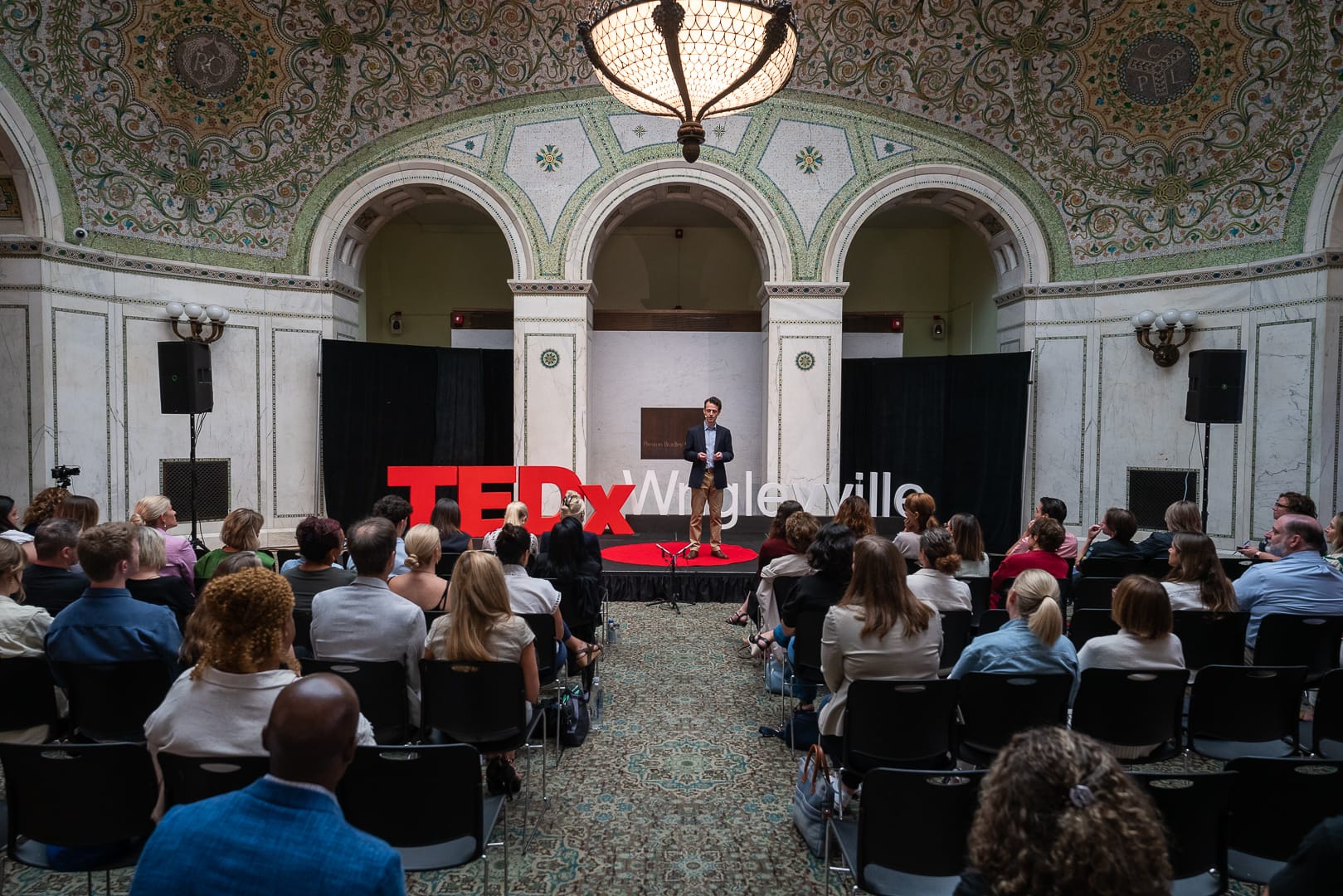Full Transcript of my TEDx Talk

My recent TEDx Talk has been viewed by thousands of people in a very short time. This leads me to believe that its message has struck a chord amongst people interested in finding new approaches to peace in our conflicted world. I hope you find inspiration in reading this transcript (or watching the speech, if you prefer). I plan on sharing more stories of unity through music in future posts. If you have any stories you'd like to share about this topic, please do!
Can Music Actually Foster Peace?
Talk given by George Lepauw at TEDxWrigleyville in Chicago, August 27, 2024
Soldiers are not musicians.
Yet on Christmas Eve, 1914, a miracle took place.
The Great War had broken out at Summer’s end. Soon, the front had become a vast graveyard.
Dug into a deep, cold, sloppy trench in the frozen fields of Flanders, and as the pallid Winter sun dimmed into darkness, a German soldier began to sing Stille Nacht, Silent Night over the shots coming from all sides.
Hearing this, British troops cowering in the mud across deadly No-Man’s-Land began to sing along.
The shooting stopped and, slowly but surely, brave and bewildered men on both sides crept out of their holes, and hesitantly walked toward each other in the open battlefield, singing in unison.
Meeting in the middle, they spent the whole night in brotherly camaraderie, exchanging smokes, schnapps, songs and stories during what was one of the deadliest wars in history.
Music had brought peace to enemies.
If it hadn’t been for the orders of generals to resume fighting the next day, this conflict would have been over right then and there!
The other day, my hairdresser remarked that if everyone made music, there would be no wars. I think he’s onto something. Imagine if instead of guns, we gave instruments to soldiers?
My personal experiences as a concert pianist, teacher, organizer and cultural activist have convinced me that music has boundless power to inspire and unite.
The great American poet and 19th century abolitionist Henry Wadsworth Longfellow, aptly observed that “music was the universal language of mankind.”
Indeed, music is widely recognized as a natural human artform, evolving at the same time as language itself.
It touches on our emotions, whereas language speaks to our minds. The two combined spark an explosive reaction upon the human psyche.
From the very dawn of humanity, music has served as an instrument of social bonding and mutual understanding, reinforcing tribal unity and cooperation, necessary for the survival of the group. From hunting and gathering, to migrating, ritual and entertainment, music has been ever present in the human experience.
Music today follows upon these early traditions, the main difference being that we can now enjoy it at will. This is both a huge luxury, and an unfortunate disincentive for making music ourselves.
Up until the advent of the phonograph and radio, everyone partook in music-making.
Now, we just pick up our phones and press play. But our deep need for music remains as strong as ever.
A luminous insight is revealed by this: in each one of us lies a natural musician. And while talent is unevenly distributed, I’m convinced everyone has a gene for music.
Don’t we all have experiences singing in the shower, humming to the radio, whistling while walking, chanting at church or at a sporting event? Even clapping hands or dancing at a concert are instinctual acts of music-making.
Not a single culture on Earth has arisen without music, unless it’s been banned or restricted in some unnatural ways, as it’s most recently been in Afghanistan and Chechnya.
In fact, music is such a deep-rooted part of what it means to be human that even NASA sent a representative sample into deep space on the Voyager probe in 1977, in case it encountered curious aliens wanting to know more about us.
And while listening to music is fantastic, making music is essential. Doing so brings unlimited joy and solace, empathy and compassion. It reconnects us to ourselves and our fellow human beings at a time when our digital lives are disconnecting us.
Instead of letting division reign supreme, music moves us toward love supreme.
Music is powerful, and when it’s harnessed for good, it changes the world.
Ludwig van Beethoven’s 9th Symphony with its famous Ode to Joy finale on a poem by Friderich Schiller, about freedom and fraternity, has done just that for the last two centuries.
To this day, the Ode to Joy remains one of the most beloved tunes, known to all: da da da da da da dadaaa...
It was most famously conducted in Berlin by Leonard Bernstein on Christmas Day, 1989, shortly after the Wall separating the city in half had come down, with an orchestra and choir made of both East and West Germans. Broadcast to millions, this concert celebrating the end of a divided Germany, sent a resounding message of hope and unity across the world.
Beethoven intended this work to inspire humanity, with a new vision for a joyful and fraternal human race living together in peace and freedom.
The Ode to Joy has been used at key moments throughout history. Chinese students blasted it as they stood tall in front of tanks in Tiananmen Square; Chilean protesters sang it as they took down their dictatorship; it was performed in Japan after the devastating earthquake and tsunami of 2011 to bring its people strength; teens in Africa have managed to perform it on makeshift instruments; Jews and Muslims have done it together as part of the West-Eastern Divan Orchestra founded by Israeli conductor Daniel Barenboim and Palestinian scholar Edward Saïd. And most recently, it’s been used to bring attention and hope to the plight of Ukraine.
The Ode to Joy is also the official anthem of the European Union: 27 countries which, with their different cultures, languages, and religions, have rarely been at peace in centuries past. The Ode to Joy symbolizes the unity achieved under recent, joint democratic institutions.
In the USA, My Country ‘Tis of Thee, penned in 1831 by Samuel Francis Smith, has served as a potent and unifying, if unofficial, anthem beloved by all Americans.
While this hymn was sung at Barack Obama’s inauguration by none other than Aretha Franklin, its most significant performance was when the world-famous American opera singer Marian Anderson sang it on the National Mall in Washington DC, in front of 75,000 people of all colors in 1939.
The story is interesting. Howard University, which had invited Anderson to perform, tried to rent the 4000 seat Constitution Hall from the Daughters of the American Revolution who owned it.
However, the DAR refused due to their rules on racial segregation.
Indeed, Marian Anderson was a black artist.
Upon hearing this, First Lady Eleonor Roosevelt publicly resigned her membership from the DAR in protest and arranged, with her husband, President Franklin Delano Roosevelt, for Anderson to perform in front of the highly symbolic Lincoln Memorial instead, in a concert to be broadcast live on national radio.
Marian Anderson’s stirring rendition of My Country ‘Tis of Thee that day marked a major turning point in civil rights history by bringing national attention to the country’s color lines on a massive scale.
This event was so significant that even Martin Luther King, Jr., who’d heard this on the radio as a young boy, referred to it in his history-changing I have a Dream speech in 1963 : “This will be the day when all of God’s children will be able to sing with new meaning, ‘My country ’tis of thee, sweet land of liberty, of thee I sing.’ ”
This story also brings to mind the great Josephine Baker, who also had a major influence on the Civil Rights movement and played a role in desegregating music venues across the USA. An African-American singer and dancer who couldn’t accept the working conditions in deeply segregated America, she went to Europe instead. Overnight, she became a huge sensation, following in the footsteps of Black American musicians who had brought Jazz to France during and after World War I.
Both Marian Anderson and Josephine Baker discovered that they could live and perform freely in color-blind clubs, eat in any restaurant they wanted, stay in any hotel, and even date and marry across racial lines, which was outlawed in many states before it was made legal across the USA in 1967.
African-American artists who’d experienced freedom and success in France gained deep insight into what America could one day look like. Both Anderson and Baker were adulated and welcomed everywhere in Europe but were constantly reminded that at home they were second-class citizens and second-class stars.
The Woodstock festival of 1969 was another watershed moment in American history, an event that celebrated boundless creativity, peace and love across racial and gender lines during the unpopular Vietnam War. It helped lead to many changes, including the right to vote at 18 instead of 21, ensuring that the government couldn’t require its youngest citizens to die for their country without being heard.
Musicians have always inspired change: hits like Aretha Franklin’s feminist anthem Respect, John Lennon’s and Yoko Ono’s peace song Imagine, Michael Jackson’s and Lionel Richie’s We are the world, to help stave off famine in Ethiopia, or Public Enemy’s Fight the Power, are just some examples.
More recently, the global superstar Taylor Swift asked her fans to register to vote, resulting in a whopping 200,000 new voters in a week’s time, turning her young “Swifties" into active participants in democracy.
These stories showcase the many ways in which music can shape our lives and the world around us.
E pluribus unum, America’s latin motto, speaks to this perfectly: from the many, one. It’s the principle of unity in diversity.
Anyone who has sung together in a choir or heard one, knows how glorious it feels when many different voices come together.
Music reminds us of what democracy should always be: a way to come together despite our differences.
Music is a non-violent tool of social and political change. It sheds light onto critical issues that need addressing.
So let’s make and listen to more music. It sharpens our listening skills, opens our minds and makes us better citizens. It harmonizes the worldˋs cacophony.
Now I want to know what music inspires you? Please let me know on social media.
And since we’re all natural born musicians, let’s close this out by making music together!
I propose that we very simply hum Beethoven’s Ode to Joy, serving as a reminder for us to make music, not war!
Da - da - da - -da -da -da -da -da -da -da -da -daaaaaa - dada, etc.
Thanks for reading. To watch the speech, click here.
